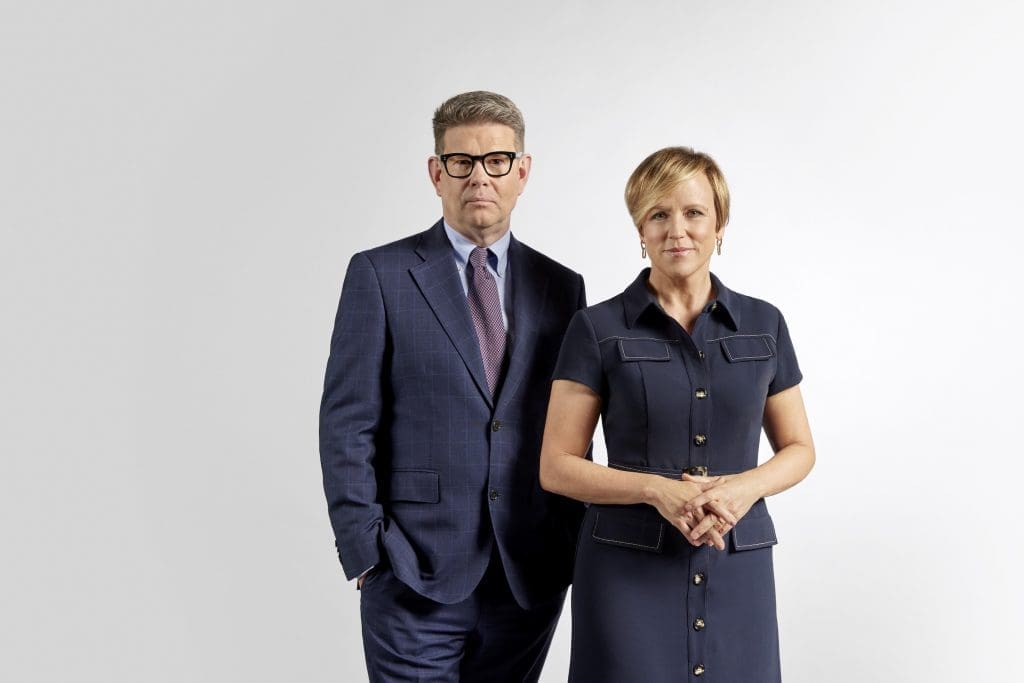In our story series ‘How Are You Today?’, we have a meandering, mental-health focused chat with some of our most well-known New Zealanders. Check out previous chats with people like Hayley Holt, Roseanne Liang and Prime Minister Jacinda Ardern. Today, we chat to John Campbell.
(First published in October 2020)
I once heard TVNZ’s Nigel Latta speak about the one downside of working with John Campbell. Nigel, a clinical psychologist, was teamed up with John for the show What Next? and told a story of meeting up with him at a local café. The pair chatted away, a woman brought over Nigel’s coffee, he politely thanked her, and they continued on the meeting.
Minutes later, the same woman came back over with John’s coffee, except John immediately stopped what he was doing, put his hand on his chest and said something to the effect of, “You don’t know how much I’ve been looking forward to this coffee,” before proceeding to sincerely and profusely thank her and engage in a conversation.
All Nigel could picture, he said, was that woman going home to her boyfriend at the end of her shift and saying “I met John Campbell today, and what a nice guy he is. Oh, and Nigel Latta was there too – but he’s a bit meh.”
When John Campbell calls me, it’s just after he’s finished up on Breakfast for the morning, and he’s still bubbling with enthusiasm and excitement. He immediately does something that doesn’t often happen when you interview someone (in my experience, anyway): Although we’ve never met before, he asks how I am, what I’m doing, how Capsule is going and what stories he’s read on it. He wishes me and the team the very best and how he genuinely hopes it all goes well for us.
I’ve been warned he has to be somewhere in half an hour, so I’m eager to the get to the questions, so then as the half-hour nears I warn him about the time, then again when we’re at time, then once again when he’s gone wildly over. “But have I given you enough?” he asks.
John says he’s never been good at sticking to a script, and a conversation with him goes down many different paths and unexpected turns, but it is, at all times, a generous conversation, because it seems he is, inherently a generous man.
John is currently on our screens each morning on TVNZ’s Breakfast, and this Saturday you’ll also find him co-presenting TV One’s Live Election Night Special alongside Hilary Barry and Simon Dallow from 7pm.
How are you today, John Campbell?
I’m good today! One of the lovely things about Breakfast is that you work in a wonderful team and as a broadcaster you get a long leash. The only bad thing about Breakfast is that you have to get up at half past three! Three hours of live broadcasting is intense and getting up at 3.30am is awful, but today I feel good! And I think we had a good show today, so I feel good!
It certainly looked like a good show today – particularly your last interview, you seemed to be having a lot of fun.
Yes, there is some fun! The thing is, it’s a kind program, it’s inclusive, we don’t punch down ever. Our targets are never soft and I think it’s a highly representative show. We do some quite tough subjects and we don’t shy away from confronting topics – inequality, the unlevel playing field – the issues I think we need to talk about more often as a country.
But one of the things I’m really proud of is, often we can do tough, serious stuff, then five minutes later we’ll be doing birthday calls or roaring with laughter over something Matty said.
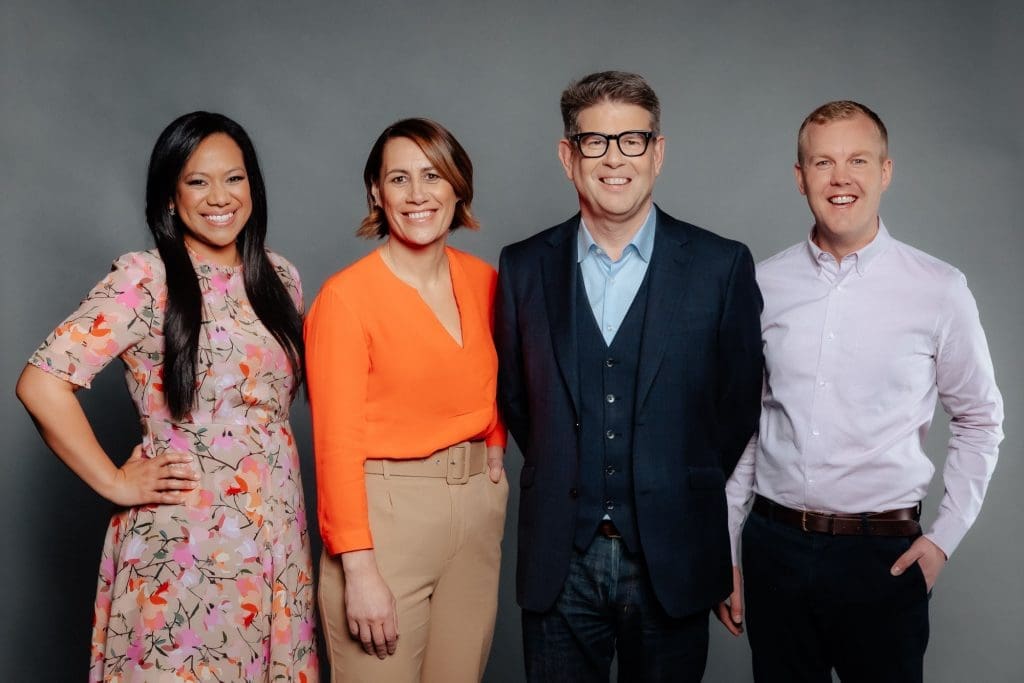
Recently I sat down with Jenny-May and she talked about one of the greatest gifts you give people – and that’s this encouragement to just be yourself, to always be your most authentic self. She said it’s something you constantly instil in her, as well as guests who come on the show. What is it about that message that you feel so strongly about?
Oh, I feel it really strongly. I often talk about it with young people because the world is a fairly overwhelming place at the moment for everyone really, but for young people it’s full of unrelenting messages around who they ought to be and therefore, also simultaneously, who they’re not.
Every time you go on Instagram there’s the rich and famous and the ostensibly successful peddling what I suspect is this lie of unequivocal happiness – all these sorts of messages that are just around success, attractiveness and wealth. And if you’re adolescent or someone for whom life is tough and you’re looking at that, you get a really profound sense that life is happening elsewhere and a really profound sense that your story is not valid.
So, what I tell people is that it doesn’t matter who they are, they are the only one out there of them. And that whatever they are going to do well in life, there will be no one on the planet who is a better them than them.
And the idea that you be true to yourself, that doesn’t recuse you from making an effort to be a good person or making an effort to approach life as well as you’re able. It just means you be the best you.
I think there’s power in being told that you matter and that your story is valid. That’s why I have these conversations all the time! And you see it a lot in broadcasting. I don’t know any broadcasters who don’t from time-to-time suffer from imposter syndrome. Because if you don’t suffer from imposter syndrome, if you face the world so unequivocally sure that you have things right, then I don’t think you’re going to be a very interesting broadcaster. You certainly won’t be full of curiosity or doubt or all the things that most avail us to be empathetic and engaged. So yes, from time-to-time, you find yourself saying, ‘Wow, I’m having a tough day today, I don’t know how I’m going’. Jenny-May will often say to me, ‘I don’t know how I’m going today’ and I’ll say, ‘Well you’re going great!’ because she always is. So I think it’s important we notice and affirm ourselves and if we see someone is struggling to do that, that you give them the message that their true self matters.
If we were going to turn that advice back on you – how would you describe yourself? What is it about you that makes you uniquely you?
I work hard. I work really hard. I’m really curious about life. I’m also really aware of my privilege and my life is in all sorts of ways a lucky one.
I’m very lucky to do what I do, and one of the things I say is that journalism isn’t a ‘get out of jail free’ card, it’s a ‘get into jail free card’! Last week I was at Lake Ohau for the fires – I’d never been there before and suddenly you’re in this beautiful place in the midst of people’s loss and sadness and people tell you their stories.
So, what I bring to that relationship is curiosity, gratitude and I never – well, I try – never ever to be cynical or cavalier about the trust people have in me. I try really hard to never betray people.
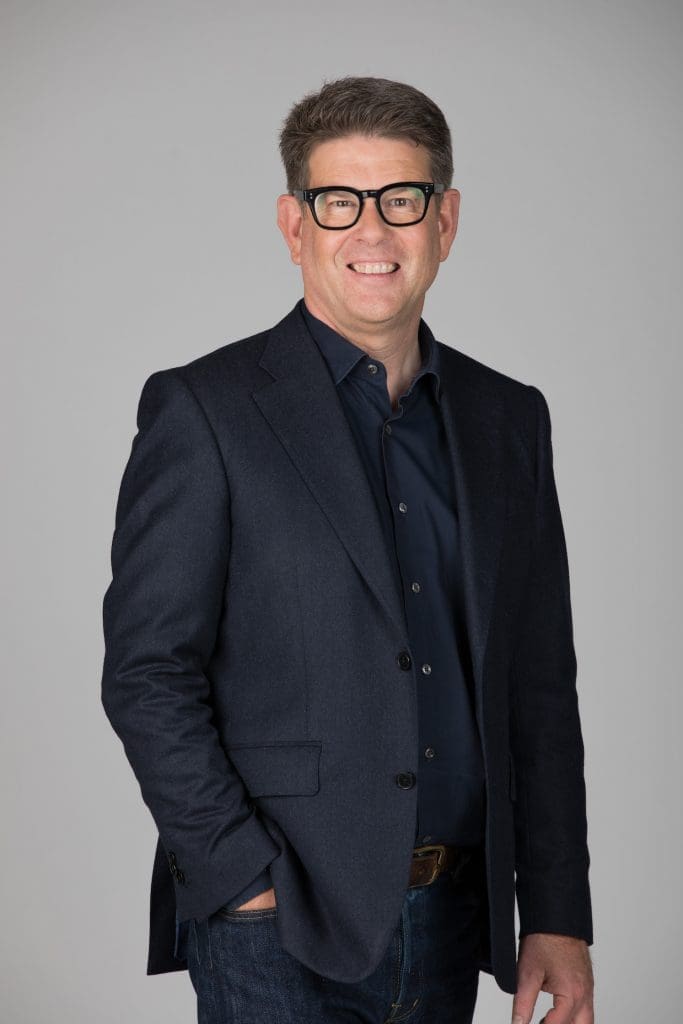

If I may, I’d add another one to that list, and that’s empathy – because, as I also said to J-May, it’s something that really sets your team at Breakfast apart – you all have empathy in spades. Do you think empathy plays an important role in good journalism?
It ought to play a role. I don’t subscribe to a ‘one size fits all’ journalism – I think the best sort of journalists play to their own strengths and we all do things in different ways. The sort of journalism I like and admire and find meaning in, isn’t the kind of prescriptive, patriarchal, ‘I have this right and the rest of you need to listen to me!’ type of journalism.
The more I am a journalist, the more I realise what makes my work have meaning is the opportunity that I have to give other people a voice.
And this has become a bit of an obsession of mine. I know we all talk about the role of journalism is to speak the truth to power and it is, absolutely, but I’m not as interested in that as I used to be, because I’m a fairly powerful person and if I speak to powerful people on the platform I have, then it’s just an endless circle of the powerful talking to the powerful. There’s a word for that, it’s hegemony and journalism shouldn’t be hegemonic. What I’m interested in, is the people who aren’t powerful but whose stories are as important and as valid as humans.
What I started to realise very strongly during Campbell Live is that if you go out and ask people to tell their stories, 1. They are grateful for the opportunity and 2. They usually want to tell them. And if they’re people who don’t have press secretaries, who don’t have media managers or spin doctors or access to advertising agencies, their voices won’t have been heard much in the past. Saying to them, ‘Tell your story’, I think is probably the part of the job that I love the most.
This year has been one hell of a year, and at Capsule we’re often talking about the mental health crisis that is happening right now in New Zealand. In terms of the scale of it after a crisis, some experts are looking back at what happened in Christchurch after the quakes. You were very immersed in it – what did you see in terms of people’s mental health recovery?
In what I saw, the mental health timelines were all very particular to the individual in Christchurch – there will still be people who haven’t recovered in Christchurch.
There will be children – if you think of your age of consciousness and awareness, the things you can really vividly remember, that probably starts at about three or four, so there are going to be kids who are 14 or 15 now who have no pre-earthquake memories. And if Mum and/or Dad have been in disputes with insurance companies or not been able to rebuild or bought an on-sold where everything behind the floorboards had not been solved, then there’s been an unrelenting stress attached to life.
How did you cope with that emotional load during that time in Christchurch. It must have been a hell of a time…
Everyone was so busy, too busy. I can’t remember what flight we were on, but we landed in Timaru and there were cars waiting for us and we drove to Christchurch. Someone said, ‘You’re going to the CTV building,’ but there was no briefing, because everyone was working so hard, there was no time to stop and talk you through what had happened. Because I’d been travelling, I hadn’t seen the coverage, so when I arrived I just thought, ‘Where has the building gone? And where are the people in it?’
It was this dark and unusually cold night for February, and there are people standing in Latimer square just kind of looking at the smouldering ruins, so you go across and you start chatting. I remember speaking to a man, who I will never forget – we were just chatting, and then I realised that this man I was speaking to, his wife was in there. You just think, ‘Oh My God’. It’s terrible. It’s truly terrible. I don’t know how people recover from that. Do you ever fully recover from that?”
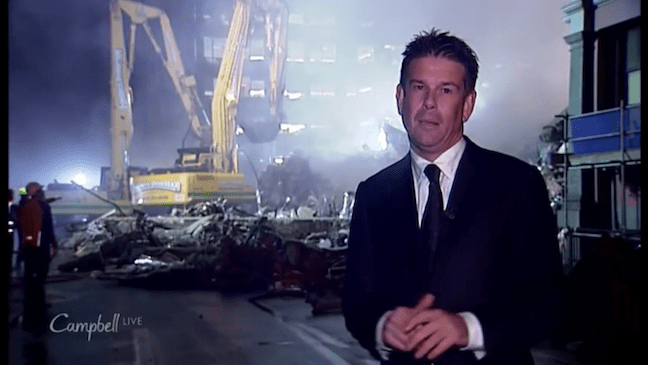

Jesus. What do you do with those stories? And how do you process that trauma – because even as a witness, it’s a lot to carry.
I don’t see my mental health as particularly material because, while I was absolutely immersed in it, I still got to go home at the weekends.
I have carried every story with me, I never ever leave the stories behind. You carry them with you, some part of you always has those stories in you, because it’s human suffering and it’s human loss and it’s human grief and it’s human bewilderment and you can’t just jettison that out the back door like jet trash.
And so, I carry those stories with me, whether it’s the Samoan tsunami, the man I met who was looking for his daughter who we found in a tree, or Christchurch or Covid-19, or Pike –because I got very, very close to that story – you carry it all with you.
But it’s always worse for the people’s whose life it is. And I don’t forget that for a moment, that I get to go home. Even in the toughest of moments in Christchurch after February when I was basically living there, I still got to go home for the weekend and Auckland wasn’t shaking. There was no one in Auckland wondering if the insurer was going to pay out or whether their entire suburb was going to be written off the map! So you had respite from it, same as with Pike, so the lived experience is always tougher.
But boy, you do, I carry it with me and I think it’s shaped my attitude towards life, that – there’s the lovely Auden line, ‘We must love one another or die’ and I really believe that, that kindness will save us in the face of the vulnerability and precariousness of now. Who knows what’s going to happen now?
The weight of those stories, the grief of those stories, must be a lot to carry around at times. Do you ever worry that it will sneak up and overwhelm you?
I know this is contrary and I know my friend John Kirwan will say, ‘JC you’re not doing this right’, but I just keep going. I know that every expert on the planet will say, ‘You need to confront this’ but I find the best thing for me is to just keep working, so I just keep working, I don’t know whether long-term that is going to be a disastrous strategy, but at the moment I find that If I immerse myself in today, then tomorrow tends to happen!
It seems quite impressive that you’re still so open to delving into that grief – how is it that you haven’t become hardened or cynical as a result of what you’ve seen?
Because you make conscious decisions about it. I think scepticism has a place in journalism, but I’m not a fan of cynicism, because it seems to me that cynicism sells everyone short. Robust scrutiny and even sometimes, a strong calling out – like we did in Christchurch with Campbell Live, and over the All Blacks in Samoa – we all felt that it was disgraceful that NZ rugby had made so little effort in the Pacific and we called it out. And we called out the uncertainty around lives in Christchurch, and the really poor treatment of some insurers. I call things out, but I’ve never been cynical because cynicism doesn’t lead you to a good place, but scepticism does.
It seems to be something you practice even outside of work – from the outside it seems as though you have a great amount of optimism. I’ve seen you walking down the street a few times – you’ll be on your own, smiling, and you’ll say to strangers, ‘Good morning! Isn’t it a beautiful day?!’ Your optimism is infectious. Is that something that you were just born with, or is it something you work hard to cultivate?
I don’t know really, I just think it beats the alternative. We’re all in this together. I just feel like, most days I feel grateful for something.
If I ever stop being grateful for that then I shouldn’t be doing it, and if I ever feel cynical about the job, then I shouldn’t be doing it, if I ever feel like the job is a chore, then I shouldn’t be doing it, because of what it allows me to do and the stories it allows me to tell.
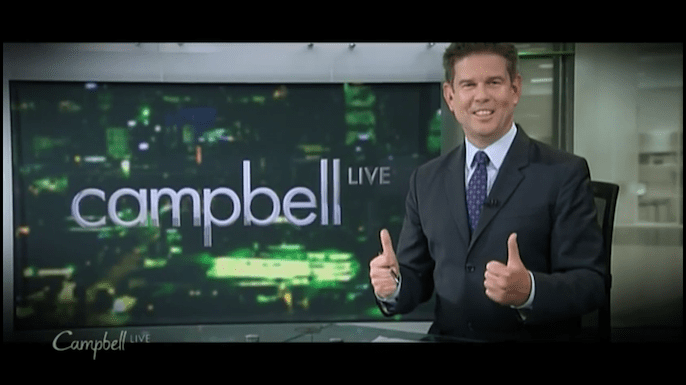

Do you have any regrets?
Oh yeah, a few. Absolutely. Can I think of instances where I’ve thought, ‘Jeez I wish I did that differently?’ Yes, quite a lot. But you just try not to make the same mistake twice.
I did my first news bulletin with Carol Hirschfeld in 1998 and basically, if you include the time I spent at Checkpoint as being on the telly, because as we were multimedia,, then I’ve basically been on the telly five days a week for the 23 years since. So in that time I’ve made an awful lot of mistakes but you just try really hard not to repeat them. And if you’ve really mucked up you do your best to make it right and at the very least you say I’m sorry.
You’ve worked with some incredible women over the years – which women have shaped your thinking or career the most?
I have worked with a lot of remarkable women. I used to read the news with Carol, she was my first boss at Campbell Live and she’s an extraordinary kind of leader and a great founder of teams and mentor of young people.
Then when Carol left I had Pip Keane – she’s just this brilliant driven singular journalist. I’m so lucky to have those experiences. And now I’m working with Jenny-May who is just this wonderful, kind, empathetic, determined person. Y’know, she was a Silver Fern, she knows what it takes to get to the top and in her case it’s just belief in hard, hard work and being truly, truly present. It’s wonderful watching her as a broadcaster and I’ve been incredibly lucky to work with so many remarkable women.
I guess to finish up, I’d love to ask you about Saturday night – you’re co-hosting the Election Night Special. Do you enjoy these kinds of special events?
It’s one of my favourite nights in the job because it’s a complete free-for-all. I love it. I absolutely love it because you can go anywhere at anytime. I was a pretty hopeless newsreader, because I’m not very good at sticking to the script – I’m not very good at being straight, whereas on election night there is no script! You’re jumping to this electorate, the next one, to this place and the next. And also the reporters, who are required to be very straight and very serious all year – particularly if they’re doing 6pm news – they’re let off the leash and you see during the night, true colour and people’s vibrance and personalities in ways which you don’t see the rest of the year. It’s really fun. I’m really looking forward to it.
